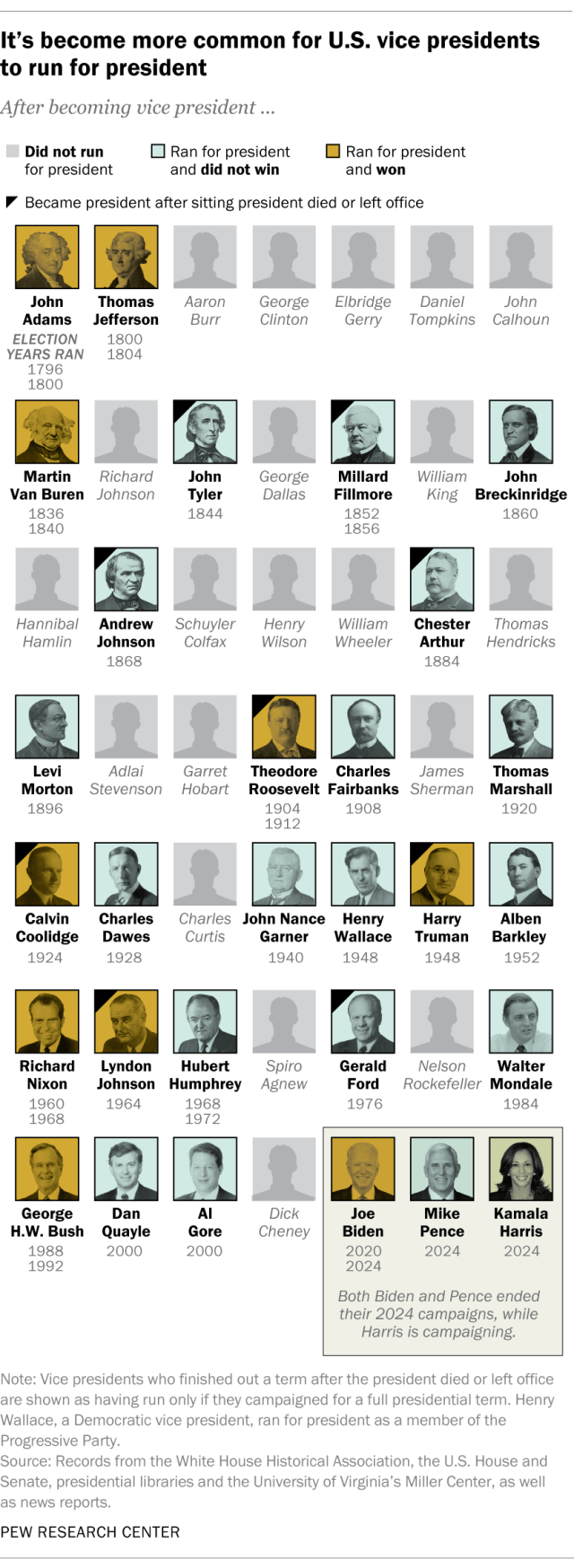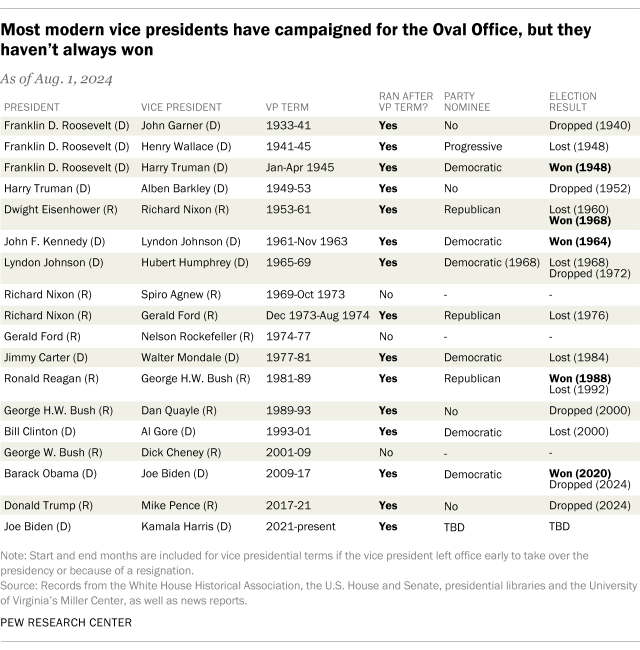
Vice President Kamala Harris has launched her bid for the 2024 Democratic presidential nomination. While most U.S. vice presidents in recent decades have sought the presidency, relatively few of them have won.
Kamala Harris’ announcement that she would run for president made us wonder how many vice presidents in the United States have ultimately gone on to become president. We conducted this analysis to look at past vice presidents who ran for the top job and how often they won.
For this analysis, we consulted historical records from the White House Historical Association, the U.S. House and Senate, presidential libraries and the University of Virginia’s Miller Center, as well as news reports.
Overall, 29 of the 49 people who have served as vice president since the country’s founding have gone on to formally seek a party’s presidential nomination, either immediately after leaving the vice presidency or in the years that followed. Ten of these 29 vice presidents – about a third – have been elected to the nation’s top political office.

Until the 1930s, it was less common for the vice president to seek the presidency. Many returned to a lower elected office or retired after serving as vice president. Still, earlier well-known presidents including John Adams, Thomas Jefferson and Theodore Roosevelt had previously served as vice president.
Among modern vice presidents, running for the top job has become more of the norm. Starting with Franklin D. Roosevelt’s first term in 1933, 15 of 18 vice presidents have launched presidential campaigns of their own after serving in the deputy role. But only five of these 15 emerged victorious: Democrats Harry Truman, Lyndon Johnson and Joe Biden, and Republicans Richard Nixon and George H.W. Bush.
Two of these five modern vice presidents-turned-presidents initially took office after incumbent presidents died and they subsequently ran for election at the top of the ticket:
- Harry Truman had been vice president for less than three months when FDR died in office in 1945, elevating Truman to the Oval Office. Truman went on to be elected president in 1948.
- Lyndon Johnson took over after President John F. Kennedy’s 1963 assassination. Johnson was elected for a full, four-year term in 1964.
Two others weren’t elected to the top office until years after their vice presidencies ended:
- In 1960, Richard Nixon – who was serving as Dwight Eisenhower’s second-in-command – lost the presidency to Kennedy in a close contest. He would run again, and win, in a 1968 match against then-Vice President Hubert Humphrey, a Democrat.
- Joe Biden, former vice president to Barack Obama, decided not to seek the Democratic presidential nomination in 2016. He went on to run and win in 2020.
Three modern vice presidents have won their party’s nomination but lost the general election. In 1948, FDR’s third-term vice president, Henry Wallace, was the Progressive Party nominee. Jimmy Carter’s vice president, Walter Mondale, secured the 1984 Democratic nomination. And in 2000, Al Gore, Bill Clinton’s second-in-command, was the Democratic nominee. Gore won the popular vote but lost in the Electoral College and conceded to George W. Bush.

Many of the 15 modern vice presidents who have run for president haven’t been able to secure a major party nomination:
- John Nance Garner, FDR’s first- and second-term vice president, opposed Roosevelt on policy and on his decision to run for an unprecedented third term. He challenged Roosevelt for the 1940 Democratic nomination and lost.
- Alben Barkley, Truman’s second-in-command, sought the Democratic nomination in 1952 at age 74. But he didn’t garner enough support and withdrew his name from the contest. The Democratic Party went on to nominate Adlai Stevenson II, the grandson of Grover Cleveland’s vice president.
- Hubert Humphrey, Johnson’s former vice president, secured the Democratic nomination in 1968 but lost the election to Nixon. He ran again in 1972 but was unable to secure the Democratic nomination, which went to George McGovern.
- Dan Quayle, who was second to George H.W. Bush, had a brief stint on the campaign trail ahead of the 2000 presidential election. But he withdrew from the GOP race early on, before Bush’s son secured the party’s nomination.
- Mike Pence, vice president to Donald Trump, ran for the 2024 Republican nomination but suspended his campaign well before any primary or caucus votes were cast.
